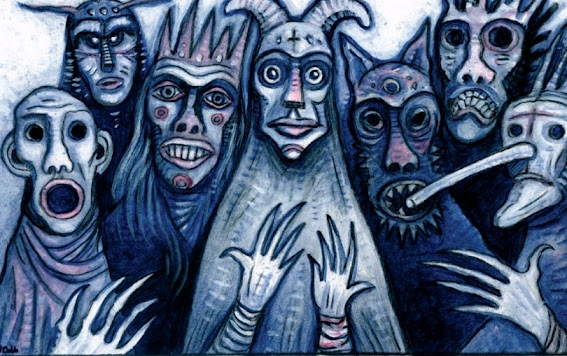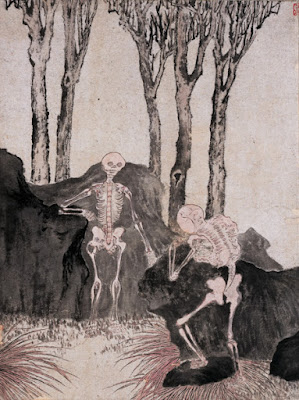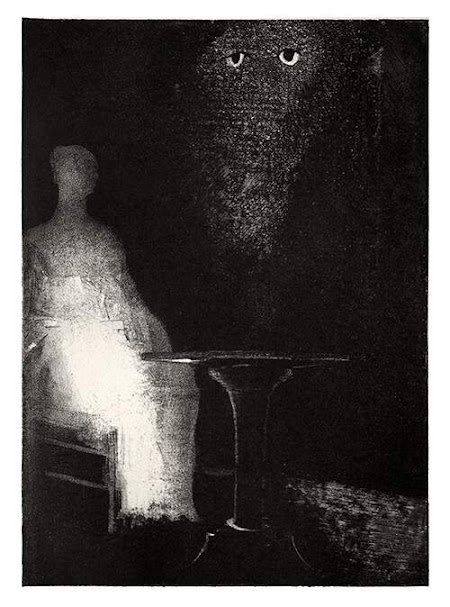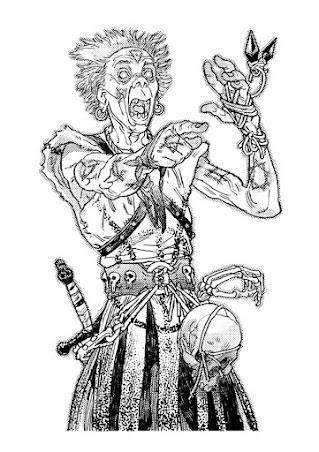The first part to this series is right here, and I am currently working on the next expansion to the Islands: Lower Dinsu, the Desert of Little Gods.
After-Leluhur
Barrows
______
The graves are only a stroll away from the village. The road is well maintained and free of grass. No one is ever here for idle reasons. The dead are not allowed to linger in the village of the living and vice versa.
Singing can be heard from the stone tombs, day or night. The smell of opium, incense, and embalming fluids wafts off of the buildings.
Inside are mummified corpses in finery, a rotting banquet set out before them. There are neatly tied bundles of bones in ornate sacks stacked along the walls. Your intrusion is not welcome.
Clan heads visit their great-great grandmothers and great-great grandfathers to know where to graze the herds and when to bring them to slaughter. Tombs of wealthier clans look pristine. The resting places of the destitute are left to fall to ruin.
The Dead
______
Not everyone in B’gutym returns after death. Supposedly one must possess the blood of Dihargai, but this has never been proven. Whatever means sustains them, the dead are a fact of life here.
Shades of B’gutym consider themselves to be a cut above other ghosts. After all, their people have been blessed by Yama themselves to return. Foreign spirits are driven off mercilessly.
Ancestors see their descendants as servants, aides, and extensions of their wills. Only the death speakers keep them from dominating the living entirely. Even then, most posts of true importance are filled by the unliving; they’ve had decades to build networks of favors, and decades to sharpen their skills.
The emotional state of an Ancestor crystallizes upon what they’re feeling when they died. All care is taken to make sure elders die happy.
This Ancestor is locked into a pattern of:
1d10 |
|
1 |
Vengeance. Everyone who ever wronged them must pay. |
2 |
Terror. They entered the afterlife in fear and are barely keeping it together. |
3 |
Acceptance. They spend their existence in a state of pleasant apathy. |
4 |
Resentment. Being denied has made them entitled. Plots against everyone. |
5 |
Insanity. Their mind was slipping away before death but they’re now mad as a hatter. |
6 |
Obsession. They became fixated on a specific task before passing and must complete it. |
7 |
Optimism. After slipping away peacefully they now have eternal rose colored glasses. |
8 |
Restlessness. Nothing is ever satisfying. They are always searching for something new. |
9 |
Greed. Turns out you can take it with you. They intend to take it all. |
10 |
Grief. They died in tragic circumstances and can barely focus on anything else. |
They demand from you:
1d10 |
|
1 |
An erotic show. Their tastes have grown quite specific over the years. |
2 |
A youth to engage in an ecstatic display such as a frenzied dance, or wild ululating song. |
3 |
An epic song recounting the entire genealogy of their clan. This can take days. |
4 |
A fine boar or goat. No trace of the animal is ever found after it goes into the tomb. |
5 |
A display of wanton vice; someone consuming mass amounts of opium, food, or booze. |
6 |
Fresh blood to drink, taken from a violent combat. |
7 |
A song they have never heard before. Sing a good one and you get to keep all your digits. |
8 |
A long stroll. They await the arrival of their descendants with a curtained palanquin. |
9 |
Something interesting to gamble on. |
10 |
An intriguing conversation or lively debate. All kept at a whisper, of course. |
Anarba, Instructor
“Keep your hands up. Wait for their punch, then grab an arm and bite it.” Once Anarba was a champion for his clan, representing their honor. Now he instructs the next generation.
Wrestlers and boxers come to him to for lessons from across B’gutym. Anarba requires that his students have suffered a humbling loss before he will teach them. He wants his students hungry.
Kasih, Gossip
It
used to be difficult to snoop around when she was alive. Death was a
rush for the first few decades. But there’s no more thrill if you
can’t get caught.
Kisah
is now concerned with using the various tidbits she overhears to spin
the rumor wheel about. She takes delight in undoing the plans of her
fellows, seeing the living as amusing pawns.
Olzii, Goat Baron
He died choking, and he will brag about that to you in a booming voice, “Haw-Haw! I wanted the meat so bad it killed me!” A walking encyclopedia of caprine knowledge, Olzii has mentored generations of shepherds in order to keep his clan prosperous.
A big man in life, Olzii is an even bigger ghost. Decades of ceaseless feasting have left him swollen to the size of a hut, and his wealth has allowed him to buy a multi-roomed tent the size of a small palace so he can gorge in peace.
Enebish, Wing Collector
There’s no way to guarantee that an elder dies in a way helpful to their descendants, most of them manage to at least have some utility to their families. He was obsessed with flying creatures before his death, and the fixation did not fade when he returned.
Enebish is usually left alone. The only thing which rouses them is the possibility of adding more wings to their wall. Butterflies, moths, birds, and bats—he will pay a premium for new specimens.
Jebka, Bloodline Witch
“Ohhh! I felt them kick! They’ll grow up big and strong. Just you wait.” She shows up at every birth in the village, and helps clean up afterwards. No one gives it much thought.
She uses the bloody rags as the basis for blessings, and for hexes. Jebka believes she knows what’s best for the village, and she’s more than willing to play matchmaker. Or executioner.
The Romance of Dihargai and Serakah
______
King Dihargai had fulfilled his oath to please his people for all time. Those musicians not willing to destroy their instruments were executed, and the king was left without purpose once more.
He wandered his lands on foot, making his acquaintance to shepherd, hunter, and merchant alike. All of them had heard his songs. Delighted, the king wandered for years. Then decades.
Wizened and sun-baked, the elderly ruler was beloved by all his subjects. Knowing his route, they eagerly awaited Dihargai’s annual visits. But one year he never came.
Unknown to them, Yama had commanded their servant, Serakah, to claim the king’s soul.
The spirit flew from the underworld to B’gutym. Searching for five nights, Serakah found the king on a hill, singing a song of respect for a boar he was butchering for that night’s supper.
The spirit was stilled by the voice of the king, and Serakah fell in love. Instead of taking Diharga with them to the underworld, the spirit appeared to him and confessed their eternal devotion.
The absence of Dihargai in the underworld did not go unnoticed by Yama. Calling for Serakah five times, Yama flew out in search of their servant.
Hearing their lord calling for them, Serakah tried to hide their beloved underneath a pile of stones.
Yama came upon the spirit and asked them where Dihargai was. Serakah lied, but the proud old king sang his name out from beneath the rocks.
Impressed by their bravery, Yama decided to stay their hand from ever claiming the souls of those with the blood of Dihargai flowing through their veins.
When Dihargai died, his body was taken to a tomb-palace of stones, his corpse refusing to rot.
The Bounties of B’gutym
______
The land of grass and stones only seems barren to those who have not grown up around its wonders. The folk of B’gutym have found many ways to wrest wealth from their homeland.
Spectral Cheese
Much like people, some animals don’t die all the way in B’gutym. Freed in death, many of these beasts go wild. Some hunters make their living tracking these animals down.
Spectral goat’s milk is made into spectral cheese. A hunk of it can make the imbiber’s spirit as fast as a horse while their body stays still. Careful not to get lost!
Mummy-Wine
Even in death, you still gotta get ahead. Some from B’gutym come back as spirits, but there is more prestige in self-mummification. Elders drink this lacquer-liquor mixture to help it along. Forcefully.
Blood red, thick, and sweet as syrup. Taking a sip lets you see ghosts. Downing a bottle lets you punch them in the face. The seizures hours later are a small price to pay.
Sprouting Marble
Taken from quarries where flash-floods have claimed the lives of miners, these greenish hunks of marble are as light as grass but as hard as stone.
Plant a fistful in the ground and it sprouts more of itself like a budding tuber. Dig it up a year later and there’s enough to carve a statue. Wait a decade and you could build a tomb.
Vanishing Boars
Wane and unhealthy looking, these boars are startlingly tough and surprisingly intelligent. Local stories tell that they are the inhabited by the spirits of enemy warriors who died on raids.
When threatened they can fade into nothingness, then reappear a short distance away. Their meat is delectable, and it extends the lives of those who eat it.
Bottled Song
Labor in the land of grass and stones is set to song. The enterprising merchants of B’gutym have found ways to preserve this means of organization for sale.
Pop the cork and listen to the chorus. Have the foreman teach it to slaves or workers, and watch them till the fields double time.
Mirrored Hibiscus
These flowers come in what appears to be a riot of natural hues. Closer examination reveals that something is subtly off about their colors, reflecting the opposite to that of the light around it.
Brewing tea from their petals shifts the colors of the world around you into their chromatic opposite. Camouflage ceases to function, and hiding spaces are easy to spot.
Second Son’s Grass
Grows in small clumps in valleys among taller grasses. Reflects light like chrome. Reaches forcefully when the living draw near. Slithers around limbs, squeezing to death like a boa.
Sold in either nondescript parcels, or lacquered boxes fit for tribute. The dried blades springs out and tries to wrap around the neck of whomever opens it.
Shrine to Nothing
Death Speaker Sanctum
______
A beaten path, punctuated by cairns adorned with warning flags whipping in the wind. A pagoda rises over the grass. It is half a day's walk away from Leluhur.
The abbey is given tribute of wine, food, companionship, and skilled labor. Anything the monks need. No one wants to give them a reason to come to the village.
Songs pleasing to ancestors are not sung here, the conversations between the monks and hourly striking of a gong keep the ghosts far away. Death speakers never leave spirits behind. They will brag of this to you.
Those Between
______
Yesui, Initiate
Everyone in B’gutym hears ghosts. Some like Yesui see them. The girl began to see her ancestors as a teenager. When her talent was discovered, she was taken by the monks.
The monastery has been hard to adapt to. The elder monks hardly seem human. They took one of her eyes and some teeth as a “sacrifice.” All she has to do is get through this. Then she can escape. The ability to walk through walls will make it much easier.
Enx, Weretiger
“Just tell me where they went and you won’t be harmed.” Enx was set apart by the Abbot after the boy’s dark nature was noticed. He was an ideal candidate for potential training as an exorcist.
Instructed in the way of Hollow Claws by an elder of the monastery, Enx embraced curse of the weretiger with glee. His partner tells him which ghost’s corpus to shred. He complies eagerly.
Solongo, Investigator
His smiles never reach his eyes, even as he guffaws at his own jokes. He’s watching, always watching. He asks questions disguised as idle chatter, and ferrets out answers by acting a fool.
Solongo is more reliable than Enx when it comes interviewing witnesses or gathering evidence. Not much in a fight, he supports his partner by using his ability to project bad fortunes onto his foes.
Cotota, Speaker
Policing the dead is no easy matter. They are insubstantial, often invisible, and generally insane in some way. Cotota was given the job because as the eldest of twelve, her patience is nearly boundless.
She is always tactful with the local ancestors, but that is only due to clan politics. If she had her way she’d annihilate any ghost who offended her. Cotota cries tears of pitch, whose touch dissolves the corpus of spirits like acid.
Tumbinai, Graverobber
The job is thankless. Dig, dig, dig. Run, run, run. Hide, hide, hide. But the rewards to Tumbinai and his order are beyond measure: materials to extort the dead. He exults in the power he holds over them by possessing their remains.
Tumbinai’s existence is denied by the order, and their potent wards to keep it that way. He knows his position has a high turnover rate, but he’s young and quick on his feet. He’ll be fine.
To gain their abilities, death speakers must bargain something away to Yama. This speaker gave up:
1d10 |
|
1 |
Their face. They have no physical features. No one knows how they eat, breath or see. |
2 |
Their voice. They cannot speak, and they must sign to be understood. |
3 |
Their emotions. Since their initiation they feel little save a predatory hunger. |
4 |
The love others once held them in. They can never gain anything but icy acquaintances. |
5 |
Their physical form. They do not age, instead they rot. |
6 |
Their sense of safety. The death speaker is always flighty and looking over their shoulder. |
7 |
Their identity. They have no ambitions, but are inexhaustible. Their fellows direct them. |
8 |
Their past. No one who knew them before they became a death speaker can recall them. |
9 |
Their interactions with all but the dead or other speakers. They’re like ghosts to the living. |
10 |
The daytime. They can never go out into the sun—it burns them away like morning fog. |
In return for their offering, the death speaker gains the ability to:
1d10 |
|
1 |
Raise a corpse as a servant with a touch of their palm. |
2 |
Unerringly sense where living beings are, even those behind barriers or veiled by magic. |
3 |
Step through the barrier between the living and the dead as if it were a curtain. |
4 |
Cause unbearable agony to spirits by laughing. |
5 |
Tear out chunks from the souls of other beings. Causes psychosomatic wounds and ennui. |
6 |
Turn invisible, so long as they either close or cover their eyes. |
7 |
Attract spirits using the scent of blood spilled by their hand. This includes their own. |
8 |
Whisper to the spirits of objects to learn where they have been and who has held them. |
9 |
Paralyze ghosts. Their gaze can freeze incorporeal beings so long as they stare at them. |
10 |
Know the exact date and means of a living thing’s death at a touch. |
Dihargai’s Malaise
______
Looking across his kingdom, Dihargai reflected on the changes in his subjects. They had grown rich from tribute, as well as strong, joyful, and vibrant. They were also fractious, and cruel to outsiders.
Serakah ranged further and further from court, and the Dihargai began to feel listless. The Nine Score Kings only served as a further annoyance. Even his annual journeys around his realm began to bring less satisfaction to him. After the long roll of years the patterns in his people were all too apparent to him.
Seized by ennui, Dihargai began to lose himself in diversion. He lost days at a time possessing drunks, opium addicts, and the gravely ill. He grew jaded, and lacking other avenues of experience, the king sought to explore his darker urges. Dihargai found instruction in dark magics and the nine torturer’s arts.
Living as a hermit, rumors began to spread over the reason for Dihargai’s absence from court: the king had gone mad, the king was waylaying and murdering isolated travelers, the king had begun to truck with demons and gamble with the souls of his subjects. Something had to be done.
The Nine Score Kings called for a tournament, with competitors invited from across B’gutym. Over two hundred matches were held, and a champion emerged: a young woman named Tarantha. She was exhorted by the Ancestors to find Dihargai, and to remind him of the duty he held to his people. Instead, Tarantha went in search of Serakah.
Serakah had taken to lurking near an entrance to the underworld. When Tarantha found them after five days of searching, she chastened them for forgetting their vows to Dihargai.
Coming to their senses, the shade joined Tarantha to look for the vanished king. After nine days of searching, they came upon Dihargai. The ghostly king was standing over the bodies of a slain caravan. Begging them to come to their senses, Serakah and Tarantha were able to convince the king to accompany them.
The trio made their way into the underworld and after many adventures together, they came to Yama’s court. The three explained their need, and Yama gave their decision: those ghosts of B’gutym’s blood would fade when their wills failed them.
Bidding a farewell to the land he loved, and to the young hero Tarantha, Dihargai joined his dearest Serakah in the place below.
Thus ends Dihargai.
Court of the Nine Score Kings
______
Carved directly into a bluff of jagged hills which shadow the settlement surrounding it, the tomb-palace was once the resting place of Dihargai’s body. Later kings commanded their descendants to bring their corpses to join Dihargai’s, and a tradition was born.
Outside,
canvas tents and grass huts have been erected by those wishing an
audience with the Nine Score Kings.
The
court is filled with serene quiet, broken only by the shuffling of
papers, the tread of servant’s feet, and low dirges to address the
Kings.
In the throngs outside the court you meet:
2d6 |
|
2 |
An educated villager hoping for a job as a functionary. Willing to slit their own throat to (possibly) return as an ancestor in order to fulfill the post’s requirements. |
3 |
A merchant-magnate seeking safe passage for their caravans. They’re eager to grease the wheels. |
4 |
A group of extremely angry villagers whose ancestors have gone missing. They blame an exorcist supposedly lurking in their midst. |
5 |
Rival groups of brigands trying to resolve a dispute before it escalates to violence. Everyone involved has valid points. |
6 |
A dignitary on behalf of Doru, Qelong, or Yoon-Suin, coming to pay tribute. They have ulterior motives. |
7 |
An aggrieved ancestor complaining about the lack of care they have been given in their home village. They are out for blood. |
8 |
Two clan heads arguing over grazing rights. Both of them are well-known, and equally loathed. |
9 |
Weasel-folk envoys from the north. They demand eggs. Eggs! |
10 |
Death Speaker exorcists. They’re demanding the right to destroy a prominent ancestor. |
11 |
A hunter bearing pelts of never before seen animals. They aim to curry favor for their village. |
12 |
A foreign priest, come to deliver a vision of death or ruin to add to a King’s collection. |
If doubles are rolled there will also be a group of royal guards shaking down the crowd.
Monarchs of Grass and Stone
______
There are usually less than one-hundred and eighty members of the court at any one time, with the number of active members of the royal house fluctuating between one and three hundred. In spite of their poetic title, women are members of the court as often as men. They’re still called Kings.
Eccentricity and pettiness are to be expected from the royal ancestors, and their plots against one another are things of local legend. Outsiders rarely stay long; business is done and then they leave as soon as possible. No one wants to be a cats-paw in a centuries long plan.
This particular King is chiefly concerned with:
1d10 |
|
1 |
Advancing the interests of their clan. |
2 |
Pursuing some bizarre hobby or interest. |
3 |
Proving themselves the worthy successor to Dihargai. |
4 |
Meddling in the affairs in some foreign state or culture. |
5 |
One-upping a rival King. |
6 |
Keeping the living under the thumb of the ancestors. |
7 |
Working with the death speakers to curb the excesses of a mad King. |
8 |
Raise the prestige of B’gutym as a whole. |
9 |
Getting filthy rich. |
10 |
Having as much fun as possible. |
And
is involved in a plot to:
1d10 |
|
1 |
Assassinate a foreign dignitary. |
2 |
Assassinate a local magnate. |
3 |
Humiliate a rival. |
4 |
Execute a masterstroke, ending a centuries long blood feud. |
5 |
Force another clan to submit and become incorporated by their own. |
6 |
Drive a rival King from the court. |
7 |
Secure the rights to a lucrative trading post for their clan. |
8 |
Gain the services of a powerful ally or group. |
9 |
Break off from a clan theirs was forced to join. |
10 |
Destroy a death speaker monastery grown too independent. |
Dagasi, Clan Matriarch
She does not issue commands, she gives suggestions. Decades of cultivating spies has given Dagasi eyes everywhere, ensuring her suggestions are followed. She is not well-loved.
Dagasi tells herself that their muttered threats and whispered words are worth the results. The clan is strong, and their raids have made them rich. She just needs to make sure everyone just listens.
Yeke, Merchant Lord
His wealth is legendary. When someone needs sponsorship for something, they come to Yeke. From a roving clan of traders, the partnerships Yeke formed in his living days serve his family even now.
Every scrap of Yeke's remains are encrusted with jewels and precious metals. He pays servants to keep them shining and lustrous. It is easy to get a meeting with him, hard to keep his attention. All he cares about is amassing more money.
Shagus, Gadfly
Existence became dreadfully boring over a century ago. All their rivals are dead or dissipated. All their friends have since moved on. All that remains for Shagus is the intrigue itself. They exist for drama.
There is no conspiracy that will not catch his interest. He is relentless in ferreting out rumors and salacious gossip. He’ll insert himself into any plots he uncovers, advancing their interests with the fanaticism of a convert. If and when the wind blows against them, he sells them out.
Muunokhoi, Fixer
“How can I help you, sweetie?” Muunokhoi can solve any problem, or so the saying goes among the raiders of the grasslands. A frequent financier of B’gutym’s marauders, Muunokhoi apparently knows everyone, and she can arrange for nearly anything.
She has been waging a private war against the merchant houses of the north, trying to cut Yeke off from his allies to the north, and isolate him enough to annihilate the old ghost.











No comments:
Post a Comment